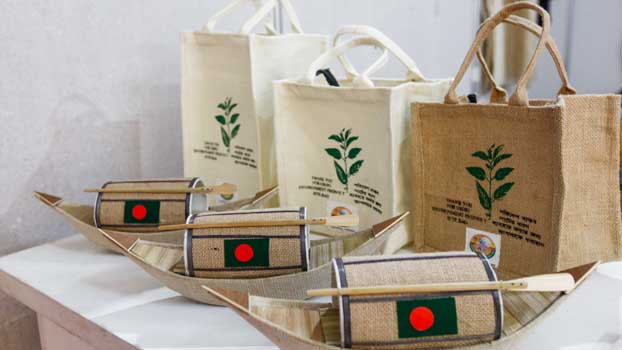Jute creates new hope

The export income from jute and jute good products has been increasing. In the last three months, the country has earned US$ 30.75 crore dollars by exporting jute and jute products despite the coronavirus pandemic.
The exports from this sector have increased by 59 percent in last three months, according to the Export Promotion Bureau (EPB).
Industry insiders said that the global demand for jute products has begun to pick up again as environmental issues have resurfaced due to the Covid-19 pandemic. The lost glory of jute will be restored, they expressed hope.
Bangladesh Jute Mills Association (BJMA) chairman Mohammed Mahbubur Rahman Patwari said, “Jute and jute products are the only major item in the export sector with almost 100 percent value addition.”
According to an updated report by EPB, the country earned US$ 307.5 million by exporting jute and jute products during July-September. This amount is about 40 percent higher than the same period of last year. And the earnings are more than 12 percent against the target.
On the other hand, export earnings of leather and leather goods declined drastically while jute and a significant export earnings were made from jute goods products in last two years.
Moreover, the export earnings of all major sectors including readymade garments except jute products have declined in the last financial year.
M Sajjad Hussain Sohel, President of Bangladesh Jute Goods Exporters Association (BJGEA) told Bangladesh Post, “The demand for jute and jute products has increased in developed countries including Europe and USA. The whole world is concerned about the increasing pollution everywhere. Environmentalists urged everyone to cut use of polythene and emphasized to use environment-friendly biodegradable products. As a result the demand of jute and jute products is on the rise.”
“Sri Lanka has recently banned the use of polythene bags. Now the demand for jute bags in Sri Lanka would also increase, he added.”
It was learnt that jute production has come down to 20 lakh tonnes this time for repeated floods. Due to this, the price of a maund has increased and stands at Tk 3,000, which is almost double than the last season’s price.
Businessmen suggested focusing on enhancing the quality and diversifying the products. They strongly suggested strengthening diplomatic relations to create more markets and demand of the ‘golden fiber’ in countries where there are potentials of exporting jute products.
Rashedul Karim Munna, President of Bangladesh Jute Diversified Products Manufacturers and Exporters Association (BJDPMEA) said the potential of jute is endless due to the production of varieties of products.
“Even if it can capture 10 percent of the potential international jute market, it is possible to earn Tk 50,000 crore a year with the jute alone,” he added.
On the other hand, the government is working to bring all the state-run closed jute mills into production as soon as possible.
“State-owned jute mills have not been closed permanently, rather the production of those mills has been stopped temporarily, the mills will be brought back into production as soon as possible,” State Minister for Labour and Employment Begum Mannujan Sufian said.
The government's agricultural information service says that the number of jute farmers in the country is currently 4 million. Directly and indirectly, the livelihood of four crore people is centered on jute. Farmers get an average of Tk 3,000 crore every season. The contribution of the jute sector to the country's GDP is 26 percent and it is 1.4 percent to the agricultural GDP.
According to the Department of Agricultural Extension, jute is cultivated in seven to eight lakh hectares of land in the country. Where more or less 82 lakh bales of jute fiber are produced. Last year, 68 lakh bales of jute were produced in the country.
According to the relevant sources, 50-55 lakh bales of jute are used in the private sector jute mills.



